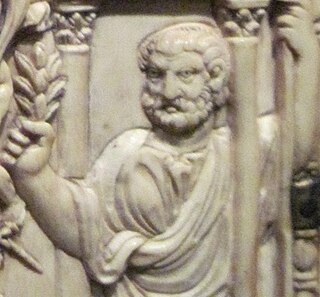Related Research Articles
The gens Gavia, or occasionally Gabia, was a Roman family of plebeian descent. It first appears in history during the first century BC, but none of its members obtained any of the curule magistracies until imperial times. The Gavi Arch at Verona was built in honor of one of the Gavii.

Quintus Aurelius Symmachus signo Eusebius was a Roman statesman, orator, and man of letters. He held the offices of governor of proconsular Africa in 373, urban prefect of Rome in 384 and 385, and consul in 391. Symmachus sought to preserve the traditional religions of Rome at a time when the aristocracy was converting to Christianity, and led an unsuccessful delegation of protest against Emperor Gratian's order to remove the Altar of Victory from the curia, the principal meeting place of the Roman Senate in the Forum Romanum. Two years later he made a famous appeal to Gratian's successor, Valentinian II, in a dispatch that was rebutted by Ambrose, the bishop of Milan. Symmachus's career was temporarily derailed when he supported the short-lived usurper Magnus Maximus, but he was rehabilitated and three years later appointed consul. After the death of Theodosius I, he became an ally of Stilicho, the guardian of emperor Honorius. In collaboration with Stilicho he was able to restore some of the legislative powers of the Senate. Much of his writing has survived: nine books of letters; a collection of Relationes or official dispatches; and fragments of various orations.
Virius Lupus was a Roman soldier and politician of the late 2nd and early 3rd century.

The Battle of Lugdunum, also called the Battle of Lyon, was fought on 19 February 197 at Lugdunum, between the armies of the Roman emperor Septimius Severus and of the Roman usurper Clodius Albinus. Severus' victory finally established him as the sole emperor of the Roman Empire following the Year of the Five Emperors and immediate aftermath.

The gens Cornelia was one of the greatest patrician houses at ancient Rome. For more than seven hundred years, from the early decades of the Republic to the third century AD, the Cornelii produced more eminent statesmen and generals than any other gens. At least seventy-five consuls under the Republic were members of this family, beginning with Servius Cornelius Maluginensis in 485 BC. Together with the Aemilii, Claudii, Fabii, Manlii, and Valerii, the Cornelii were almost certainly numbered among the gentes maiores, the most important and powerful families of Rome, who for centuries dominated the Republican magistracies. All of the major branches of the Cornelian gens were patrician, but there were also plebeian Cornelii, at least some of whom were descended from freedmen.
In Gallo-Roman religion, the Xulsigiae were triple goddesses worshipped at the healing-spring shrine in Augusta Treverorum. Edith Wightman suggests that they "may be local nymphs of the spring"; on the other hand, she also links their name to that of the Suleviae, whom she characterizes as "domestic goddesses". Their temple, a smaller shrine near the monumental Lenus Mars temple, has also yielded clay figures of the genii cucullati. The name itself is attested only from one inscription, where it accompanies that of Lenus Mars:
LENO MARTI
ET XVLSIGIIS
L VIRIVS DISETO V S L M
Volusius Venustus was an aristocrat of the Roman Empire.
Marcus Pupienus Africanus Maximus was a Roman Senator.
Servius Cornelius Scipio Salvidienus Orfitus was a Roman senator, and consul ordinarius for the year 51, as the colleague of the emperor Claudius. His father Orfitus was one of the seven sons of Vistilia, a noblewoman who came from a family that had held the praetorship, although some have erroneously stated Servius himself was the husband of Vistilia. He became a member of the gens Cornelia through adoption by an otherwise unknown Servius Cornelius Scipio.
Servius Cornelius Scipio Salvidienus Orfitus was the name of several Roman men who lived during the early Roman Empire. They were descendants of Orfitus who was adopted by Servius Cornelius Scipio, an otherwise unknown member of the patrician branch of the Cornelii Scipiones.
Sextus Catius Clementinus Priscillianus was a Roman military officer and senator who was appointed consul in AD 230.
Flavianus – the adjectival form of the Latin name Flavius – may refer to:
Lucius Virius Lupus Iulianus was a Roman military officer and senator who served as consul ordinarius in 232 alongside Lucius Marius Maximus.
The gens Orfia was a minor plebeian family at Rome. Few members of this gens are mentioned by ancient writers, but others are known from inscriptions. The best-known may be Marcus Orfius, a military tribune who served under the command of Caesar.
The gens Salvidiena was a plebeian family at ancient Rome. Members of this gens are first mentioned toward the end of the Republic, and from then to the end of the second century they regularly filled the highest offices of the Roman state.

The gens Viria was a Roman family of the second and third centuries, possibly of northern Italian origin. The first member to ascend the cursus honorum was Virius Lupus, who attained the consulship in the late second century. It is possible that the family was elevated to patrician status around that time. The family's influence reached its apex during the third century.
References
- ↑
 Smith, William, ed. (1870). "Orfitus No. 11". Dictionary of Greek and Roman Biography and Mythology . Vol. 3. p. 44.
Smith, William, ed. (1870). "Orfitus No. 11". Dictionary of Greek and Roman Biography and Mythology . Vol. 3. p. 44. - ↑ Alaric Watson (1999). Aurelian and the third century. Routledge. p. 164. ISBN 0-415-07248-4.
- ↑ Mennen, Inge (2011-04-26). Power and Status in the Roman Empire, AD 193-284. BRILL. p. 132. doi:10.1163/ej.9789004203594.i-306. ISBN 978-90-04-20359-4.